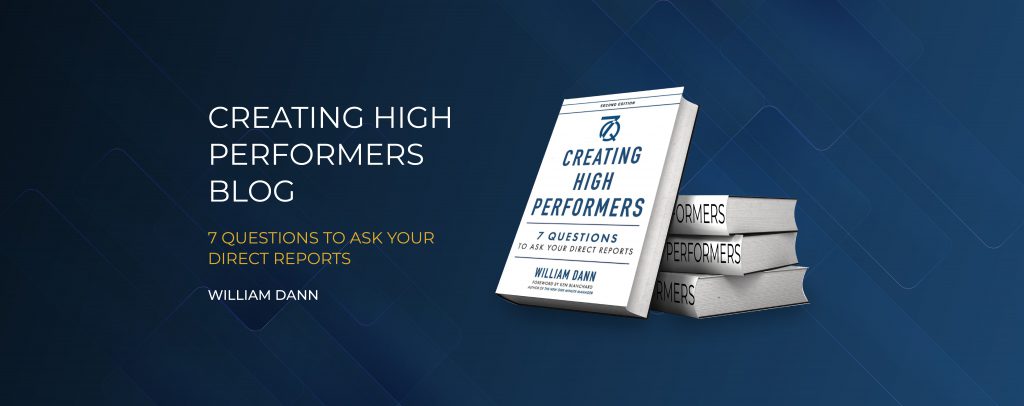- January 17, 2022
- Posted by: andreag
- Category: CommunicationHigh PerformanceLeadershipPerformance Management


The 2nd edition of Creating High Performers, contains an expanded Chapter 4 discussing why a change in the supervisor role is needed and the importance of owning this change for yourself if you are in the supervisor role. To overcome whatever baggage and cynicism your employees may have about supervisors, you must agree that there is a need for a new approach and be able to communicate your own “why”. Simply saying “I want to try something new” or “I read this book and thought I would give it a try…” will not get you honest answers as you roll out the 7 questions with your staff. I end the chapter by asking whether what you have read thus far rings true to you? Essentially, if that is not the case, no point in reading further on how to execute that new role.
This added emphasis arises from teaching and coaching managers trying to put the 7Q method to work. I have discovered that those who don’t own it and define/communicate their reason for the shift will not get honest answers, not get to the “real why” for unmet potential and, thus, never execute an effective plan to get their employees to high performance.
 I was reminded of this recently while coaching a CEO who loved the book and the method but found the questions a bit “gimmicky”. Well, that’s because they weren’t his words. I encouraged him to phrase the questions however he wished using language that was normal/natural for him. The caveat: don’t soften or change the intent of the question. I responded to him rather pointedly, “use whatever words you wish but if your words won’t get honest answers to these questions, you are being irresponsible”. You can’t ethically blame poor performance on an employee without knowing whether you have fulfilled your end of the bargain. And, you don’t have a prayer of improving performance without knowing the truth for your employee.
I was reminded of this recently while coaching a CEO who loved the book and the method but found the questions a bit “gimmicky”. Well, that’s because they weren’t his words. I encouraged him to phrase the questions however he wished using language that was normal/natural for him. The caveat: don’t soften or change the intent of the question. I responded to him rather pointedly, “use whatever words you wish but if your words won’t get honest answers to these questions, you are being irresponsible”. You can’t ethically blame poor performance on an employee without knowing whether you have fulfilled your end of the bargain. And, you don’t have a prayer of improving performance without knowing the truth for your employee.
Let’s examine why the 7 questions are key:
Clear expectations and standards of performance (Questions #1 & #2) are the foundation of the partnership. What are we trying to accomplish? What’s acceptable? What would blow you away? What would disappoint you? You can’t assume they know because these are your own standards. They aren’t found in a job description. They are in your mind and need to be communicated.
Feedback on results (Question #3). How am I doing? Where are changes needed? Where can I get better? Lack of feedback not only means no improvement but also loss of motivation. As the story of Gena in Chapter 4 makes clear, no feedback communicates you don’t care if I am doing it well or, in fact, doing it at all. It’s basic.
Chapter 7 in the new edition emphasizes the importance of the partnership being fair. Fair expectations given what is provided to help get there and then sufficient credit when the employee achieves what is expected. Questions 4 – Sufficient Authority, 5 – Timely Decisions, 6- Sufficient Resources and 7 – Credit for Results are elements of fairness. Again, if these are lacking, motivation will be lost and potential never realized.
So, come up with your own words to learn whether these elements of the performance partnership/contract are present. Remember your subordinate has his or her own equation for fairness. If the standards you set are deemed unfair, why? Can you work out what might be fair either by changing what you or the organization provides or by changing expectations? Or, is the employee just working you, i.e. is he/she really a “won’t do”?
Mutual understanding is essential for all meaningful relationships. The case studies in the book make clear that when that understanding is lost, motivation and performance suffers. Getting there is not easy but it is what you signed up for when you took responsibility for the performance of those working for you.
You will find that having the courage to ask these questions will enrich your relationship, improve performance and give you greater satisfaction from your work as a supervisor.



